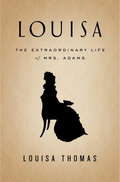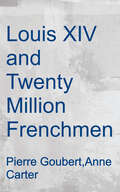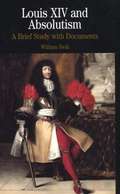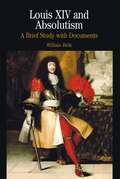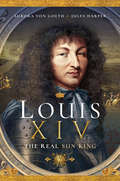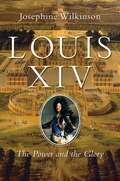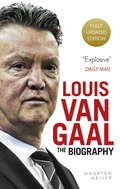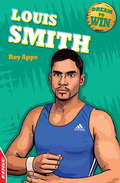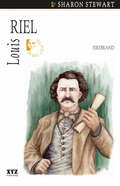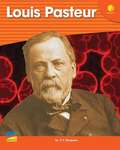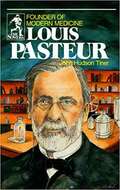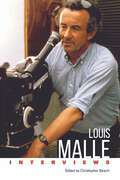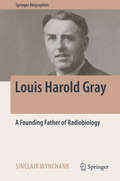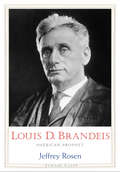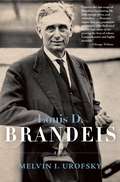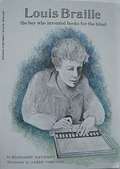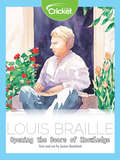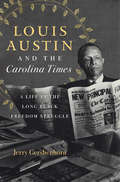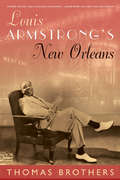- Table View
- List View
Louisa
by Louisa ThomasAn intimate portrait of Louisa Catherine Adams, the wife of John Quincy Adams, who witnessed firsthand the greatest transformations of her time Born in London to an American father and a British mother on the eve of the Revolutionary War, Louisa Catherine Johnson was raised in circumstances very different from the New England upbringing of the future president John Quincy Adams, whose life had been dedicated to public service from the earliest age. And yet John Quincy fell in love with her, almost despite himself. Their often tempestuous but deeply close marriage lasted half a century. They lived in Prussia, Massachusetts, Washington, Russia, and England, at royal courts, on farms, in cities, and in the White House. Louisa saw more of Europe and America than nearly any other woman of her time. But wherever she lived, she was always pressing her nose against the glass, not quite sure whether she was looking in or out. The other members of the Adams family could take their identity for granted--they were Adamses; they were Americans--but she had to invent her own. The story of Louisa Catherine Adams is one of a woman who forged a sense of self. As the country her husband led found its place in the world, she found a voice. That voice resonates still. In this deeply felt biography, the talented journalist and historian Louisa Thomas finally gives Louisa Catherine Adams's full extraordinary life its due. An intimate portrait of a remarkable woman, a complicated marriage, and a pivotal historical moment, Louisa Thomas's biography is a masterful work from an elegant storyteller.From the Hardcover edition.
Louis XIV and Twenty-Million Frenchmen: A New Approach: Exploring The Interrelationship Between the People of a Country and the Power of its King
by Pierre GoubertLouis XIV is one of history’s most notorious rulers. Ruling for three quarters of a century, the King of France had the longest reign in European history, and the effects of his rule would create the conditions that would lead to the French Revolution. Written by an authority on 17th century Europe, Pierre Goubert not only outlines the life the famous “Sun King." but the millions of subjects under his rule, and the effects his choices had on the them.
Louis XIV and Absolutism: A Brief Study with Documents (A Bedford Series in History and Culture)
by William BeikThis unique collection of documents with commentary explores the meaning of absolute monarchy by examining how Louis XIV of France became one of Europe's most famous and successful rulers. In the introduction, William Beik succinctly integrates the theoretical and practical nature of absolutism and its implications for the development of European states and society.
Louis XIV and Absolutism: A Brief Study With Documents (The Bedford Series In History And Culture)
by William BeikThis unique collection of documents with commentary explores the meaning of absolute monarchy by examining how Louis XIV of France became one of Europe’s most famous and successful rulers. In the introduction, William Beik succinctly integrates the theoretical and practical nature of absolutism and its implications for the development of European states and society. <P><P>The documents, newly translated and carefully selected for their readability, examine the problems of the Fronde, Colbert’s grasp of the economic and fiscal dimensions of the kingdom, the taming of the rural nobility, the interaction of royal ministers and provincial authorities, the repression of Jansenists and Protestants, popular rebellions, and royal image-making. Explanatory notes, a chronology, a map, a geneaology chart, and 9 striking images further strengthen this volume’s usefulness in the undergraduate classroom.
Louis XIV: The Real Sun King
by Aurora von Goeth Jules HarperA concise, straightforward biography of the seventeenth-century French monarch and his seventy-two-year reign. Innovator. Tyrant. Consummate showman. Passionate lover of women. After the death of King Louis XIII in 1643, the French crown went to his first-born son and heir, four-year old Louis XIV. In the extraordinary seventy-two years that followed, Louis le Grand—France&’s self-styled &“Sun King&”—ruled France and its people, leaving his unique and permanent mark on history and shaping fashion, art, culture and architecture like none other before. This frank and concise book gives the reader a personal glimpse into the Sun King&’s life and times as we follow his rise in power and influence: from a miraculous royal birth no one ever expected to the rise of king as absolute monarch, through the evolution of the glittering Château de Versailles, scandals and poison, four wars and many more mistresses . . . right up to his final days. Absolute monarch. Appointed by God. This is Louis XIV, the man. We will uncover his glorious and not-so-glorious obsessions. His debilitating health issues. His drive and passions. And we will dispel some myths, plus reveal the people in his intimate circle working behind the scenes on the Louis propaganda machine to ensure his legacy stayed in the history books forever. This easy-to-read narrative is accompanied by a plethora of little-known artworks, so if you&’re a Louis XIV fan or student, or just eager to know more about France&’s most famous king, we invite you to delve into court life of seventeenth-century French aristocracy, the period known as Le Grand Siècle—&“The Grand Century.&”
Louis XIV: The Gift From God
by Josephine WilkinsonAn intelligent, authoritative, and often surprising biography of the most famous of French monarchs, by an acclaimed biographer and historian. This stylish and incisive narrative presents readers with a fresh perspective on one of the most fascinating kings in European history. Louis XIV’s story has all the ingredients of a Dumas classic: legendary beginnings, beguiling women, court intrigue, a mysterious prisoner in an iron mask, lavish court entertainments, the scandal of a mistress who was immersed in the dark arts, and a central character who is handsome and romantic, but with a frighteningly dark side to his character. Louis believed himself to be semi-divine. His self-identification as the Sun King, which was reflected in iconography by the sun god, Apollo, influenced every aspect of Louis’s life: his political philosophy, his wars, and his relationships with courtiers and subjects. As a military strategist, Louis’s capacity was ambiguous, but he was an astute politician who led his country to the heights of sophistication and power—and then had the misfortune to live long enough to see it all crumble away. As the sun began to set upon this most glorious of reigns, it brought a gathering darkness filled with the anguish of dead heirs, threatened borders, and a populace that was dangerously dependent upon—but greatly distanced from—its king.
Louis XIII, The Just
by A. Lloyd MooteIn this fascinating biography, A. Lloyd Moote provides the first authoritative account of one of the most enigmatic figures of seventeenth-century Europe. Contrary to popular portrayals of the monarch as a hapless King, Moote argues that Louis XIII was a ruler who powerfully shaped his people's destiny.
Louis van Gaal: The Biography
by Maarten MeijerSo who is Louis van Gaal? An inflexible ex-PE teacher who only knows how to act like a dictator or a footballing visionary that has made him one of the greatest ever European managers? Wherever he has gone, Van Gaal has been accused of being a domineering disciplinarian and a control freak. He is certainly, by his own admission, a man who leaves nothing to chance. A disciple in the 1970s of Rinus Michels’ Total Football philosophy, he is a fascinating contradiction – an ultra-individualist utterly devoted to the collective effort. He believes in the team over the individual, in always having a plan and a team prepared to follow it. Van Gaal led the young Ajax team he moulded to Champions League glory in 1995, went on to win titles across Europe with Barcelona, AZ Alkmaar and Bayern Munich and served two stints as national coach of Holland. It is a career that has never been short on colour and drama – from fallouts with players to rants at the media wherever he has managed. Dutch football commentator Maarten Meijer’s has written the definitive biography of van Gaal – both the man and his methods. It offers the best psychological insight so far – from his earliest roots to his greatest triumphs – into the man given the task of returning the glory days to Manchester United.**New chapter on Louis van Gaal's first season with Manchester United**
Louis Smith: Louis Smith (EDGE: Dream to Win #16)
by Roy AppsWhen Louis Smith was seven he was faced with a choice that would change the course of his whole life. He chose the path of an athlete, but he lacked concentration and was easily distracted. As a punishment his coach made him perform circles on the pommel horse...Dream to Win: Louis Smith is written by expert author Roy Apps for kids with a reading age of 7 (but could also be enjoyed by pre-teens) and illustrated with black-and-white artwork. The stories focus on top athletes and sport personalities, with each dramatic story bringing to life the skill, determination and luck needed to break through into top level competition.This title is published by Franklin Watts EDGE, which produces a range of booksto get children reading with confidence. EDGE - for books children can't put down.
Louis Riel: Firebrand
by Sharon StewartLouis Riel devoted his life to the Metis cause. A fiery activist, he struggled against injustice as he saw it. He was a pioneer in the field of Aboriginal rights and land claims but was branded an outlaw in his own time. In 1885, he was executed for treason. In 1992, the House of Commons declared Riel a founder of Manitoba. November 16 is now designated Louis Riel Day in Canada.
Louis Pasteur: Founder Of Modern Medicine (Sower Ser.sower Series Biographies)
by John H. Tiner Michael L. DenmanLearn about his early life as the son of a tanner. Experience his years of struggle as an unknown scientist and enjoy his triumph as one of the world's most celebrated heroes.
Louis Pasteur: Founder Of Modern Medicine (Sower Series Biographies)
by John H. Tiner Michael L. DenmanLearn about his early life as the son of a tanner. Experience his years of struggle as an unknown scientist and enjoy his triumph as one of the world's most celebrated heroes.
Louis Malle: Interviews (Conversations with Filmmakers Series)
by Christopher BeachA filmmaker whose work exhibits a wide range of styles and approaches, Louis Malle (1932–1995) was the only French director of his generation to enjoy a significant career in both France and the United States. Although Malle began his career alongside members of the French New Wave like François Truffaut, Jean-Luc Godard, and Claude Chabrol, he never associated himself with that group. Malle is perhaps best known for his willingness to take on such difficult or controversial topics as suicide, incest, child prostitution, and collaboration with the Nazis during World War II. His filmography includes narrative films like Zazie dans le Métro, Murmur of the Heart, Atlantic City, My Dinner with Andre, and Au revoir les enfants, as well as several major documentaries. In the late 1970s, Malle moved to the United States, where he worked primarily outside of the Hollywood studio system. The films of his American period display his keen outsider’s eye, which allowed him to observe diverse aspects of American life in settings that ranged from turn-of-the-century New Orleans to present-day Atlantic City and the Texas Gulf Coast. Louis Malle: Interviews covers the entirety of Malle’s career and features seventeen interviews, the majority of which are translated into English here for the first time. As the collection demonstrates, Malle was an extremely intelligent and articulate filmmaker who thought deeply about his own choices as a director, the ideological implications of those choices, and the often-controversial themes treated in his films. The interviews address such topics as Malle’s approach to casting and directing actors, his attitude toward provocative subject matter and censorship, his understanding of the relationship between documentary and fiction film, and the differences between the film industries in France and the US. Malle also discusses his sometimes-challenging work with such actors as Brigitte Bardot, Pierre Blaise, and Brooke Shields, and sheds new light on the making of his films.
Louis Horst: Musician in a Dancer’s World
by Janet Mansfield SoaresFrom his musical beginnings as a piano player in gambling houses and society cafés, Louis Horst (1884-1964) became one of the chief architects of modern dance in the twentieth century. How a musician untrained in dance came to make such a mark is told here for the first time in rich detail. At the center of this story is Horst's relationship with Martha Graham, who was his intimate for decades. "I did everything for Martha," Horst said late in life. Indeed, as her lover, ally, and lifelong confidante, he worked with such conviction to make her the undisputed dance leader in the concert world that Graham herself would later remark: "Without him I could not have achieved anything I have done." Drawing on the conversation and writings of Horst and his colleagues, Janet Mansfield Soares reveals the inner workings of this passionate commitment and places it firmly in the context of dance history. Horst emerges from these pages as a man of extraordinary personality and multifaceted talent: a composer whose dance scores, such as the one for Graham's Primitive Mysteries, became models for many who followed; a concert pianist for American dancers such as Doris Humphrey and Helen Tamiris, as well as their German counterparts; an editor and writer whose advocacy for American dance made him a leading critic of his time; and, above all, a teacher and mentor whose work at the Neighborhood Playhouse, the Bennington School of Dance, American Dance Festival, and Juilliard helped shape generations of dancers and choreographers. Richly illustrated, sensitive to intimate detail and historical nuance, this comprehensive biography reveals the raison d'etre underlying Horst's theories and practices, offering a wealth of insight into the development of dance as an art form under his virtually unchallenged rule.
Louis Harold Gray
by Sinclair WynchankThis book is a scientific biography of Louis Harold ("Hal") Gray, FRS (1905-65), a pioneer in radiobiology - a little known science that is nevertheless extremely important since it constitutes the basis of radiotherapy. Hal Gray's work also played a vital role in ensuring that radiography would be a safe procedure for the hundreds of millions of persons in whom X-ray pictures have been taken. The book offers fascinating insights into both the history of radiobiology and the life of Hal. It contains much unique biographical material made available to the author over the past 35 years by Hal's contemporaries, many of whom have since died. Great influences on Hal's life and studies, including his unusual high school, Christ's Hospital, and his firm moral beliefs, are described. But his life was not merely a gentle, cloistered existence in academia. Its ups and downs included events that would not have been out of place in a Hollywood drama. The book, the first biography of Hal, is intended for all who enjoy this genre (including those without a scientific background) or have an interest in the history of radiobiology and radiotherapy.
Louis D. Brandeis: American Prophet
by Jeffrey RosenAccording to Jeffrey Rosen, Louis D. Brandeis was "the Jewish Jefferson," the greatest critic of what he called "the curse of bigness," in business and government, since the author of the Declaration of Independence. Published to commemorate the hundredth anniversary of his Supreme Court confirmation on June 1, 1916, Louis D. Brandeis: American Prophet argues that Brandeis was the most farseeing constitutional philosopher of the twentieth century. In addition to writing the most famous article on the right to privacy, he also wrote the most important Supreme Court opinions about free speech, freedom from government surveillance, and freedom of thought and opinion. And as the leader of the American Zionist movement, he convinced Woodrow Wilson and the British government to recognize a Jewish homeland in Palestine. Combining narrative biography with a passionate argument for why Brandeis matters today, Rosen explores what Brandeis, the Jeffersonian prophet, can teach us about historic and contemporary questions involving the Constitution, monopoly, corporate and federal power, technology, privacy, free speech, and Zionism.
Louis D. Brandeis: A Life
by Melvin UrofskyThe first full-scale biography in twenty-five years of one of the most important and distinguished justices to sit on the Supreme Court-a book that reveals Louis D. Brandeis the reformer, lawyer, and jurist, and Brandeis the man, in all of his complexity, passion, and wit.A huge and galvanizing biography, a revelation of one man's effect on American society and jurisprudence, and the electrifying story of his time.ngs bank life insurance in Massachusetts (he considered it his most important contribution to the public weal) and was a driving force in the development of the Federal Reserve Act, the Clayton Antitrust Act, and the law establishing the Federal Trade Commission.Brandeis as an economist and moralist warned in 1914 that banking and stock brokering must be separate, and twenty years later, during the New Deal, his recommendation was finally enacted into law (the Glass-Steagall Act of 1933) but was undone by Ronald Reagan, which led to the savings-and-loan crisis in the 1980s and the world financial collapse of 2008.We see Brandeis, who came from a family of reformers and intellectuals who fled Europe and settled in Louisville. Brandeis the young man coming of age, who presented himself at Harvard Law School and convinced the school to admit him even though he was underage. Brandeis the lawyer and reformer, who in 1908 agreed to defend an Oregon law establishing maximum hours for women workers, and in so doing created an entirely new form of appellate brief that had only a few pages of legal citation and consisted mostly of factual references.Urofsky writes how Brandeis witnessed and suffered from the anti-Semitism rampant in the early twentieth century and, though not an observant Jew, with the outbreak of the Great War in 1914, became at age fifty-eight head of the American Zionist movement. During the next seven years, Brandeis transformed it from a marginal activity into a powerful force in American Jewish affairs. We see the brutal six-month confirmation battle after Wilson named the fifty-nine-year-old Brandeis to the court in 1916; the bitter fight between progressives and conservative leaders of the bar, finance, and manufacturing, who, while never directly attacking him as a Jew, described Brandeis as "a striver," "self-advertiser," "a disturbing element in any gentleman's club." Even the president of Harvard, A. Lawrence Lowell, signed a petition accusing Brandeis of lacking "judicial temperament." And we see, finally, how, during his twenty-three years on the court, this giant of a man and an intellect developed the modern jurisprudence of free speech, the doctrine of a constitutionally protected right to privacy, and suggested what became known as the doctrine of incorporation, by which the Bill of Rights came to apply to the states. Brandeis took his seat when the old classical jurisprudence still held sway, and he tried to teach both his colleagues and the public- especially the law schools-that the law had to change to keep up with the economy and society. Brandeis often said, "My faith in time is great." Eventually the Supreme Court adopted every one of his dissents as the correct constitutional interpretation. A huge and galvanizing biography, a revelation of one man's effect on American society and jurisprudence, and the electrifying story of his time.From the Hardcover edition.
Louis Braille: Lives of the Physically Challenged Series)
by Jennifer Fisher BryantA biography of Louis Braille which is written for young adult readers. An excellent choice for a book report.
Louis Braille: The Boy Who Invented Books For The Blind
by Margaret Davidson CompereA poignant story of the man who developed the Braille system of printing for the blind.
Louis Braille: Opening the Doors of Knowledge
by James RumfordIn the late 1700s, young Louis Braille overcame his disability by inventing "night writing," a system of raised dots to help blind people read. This alphabet of raised dots allowed sightless people to live more independent lives.
Louis Austin and the Carolina Times: A Life in the Long Black Freedom Struggle
by Jerry GershenhornLouis Austin (1898–1971) came of age at the nadir of the Jim Crow era and became a transformative leader of the long black freedom struggle in North Carolina. From 1927 to 1971, he published and edited the Carolina Times, the preeminent black newspaper in the state. He used the power of the press to voice the anger of black Carolinians, and to turn that anger into action in a forty-year crusade for freedom.In this biography, Jerry Gershenhorn chronicles Austin's career as a journalist and activist, highlighting his work during the Great Depression, World War II, and the postwar civil rights movement. Austin helped pioneer radical tactics during the Depression, including antisegregation lawsuits, boycotts of segregated movie theaters and white-owned stores that refused to hire black workers, and African American voting rights campaigns based on political participation in the Democratic Party. In examining Austin's life, Gershenhorn narrates the story of the long black freedom struggle in North Carolina from a new vantage point, shedding new light on the vitality of black protest and the black press in the twentieth century.
Louis Armstrong's New Orleans
by Thomas Brothers"The best book ever produced about Louis Armstrong by anyone other than the man himself."--Terry Teachout, Commentary In the early twentieth century, New Orleans was a place of colliding identities and histories, and Louis Armstrong was a gifted young man of psychological nimbleness. A dark-skinned, impoverished child, he grew up under low expectations, Jim Crow legislation, and vigilante terrorism. Yet he also grew up at the center of African American vernacular traditions from the Deep South, learning the ecstatic music of the Sanctified Church, blues played by street musicians, and the plantation tradition of ragging a tune. Louis Armstrong's New Orleans interweaves a searching account of early twentieth-century New Orleans with a narrative of the first twenty-one years of Armstrong's life. Drawing on a stunning body of first-person accounts, this book tells the rags-to-riches tale of Armstrong's early life and the social and musical forces that shaped him. The city and the musician are both extraordinary, their relationship unique, and their impact on American culture incalculable. Some images in this ebook are not displayed owing to permissions issues.
